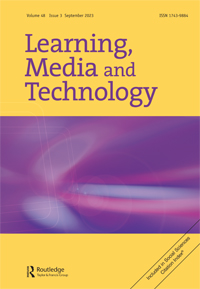Digital education utopia
IF 3.1
1区 教育学
Q1 EDUCATION & EDUCATIONAL RESEARCH
引用次数: 0
Abstract
This paper uses Levitas’s (Citation2013) ‘utopia as method’ as a way to approach the histories of digital education and its utopian possibilities. The themes of emergence, openness and desire are woven through the three modes of Levitas’s method. First, an archaeological analysis considers the relationship between digital education, lifelong learning and utopia in the political programmes of UNESCO, OECD and the UK government. Second, Levitas’s ‘utopia as ontology’ considers how critical digital education might help move us from the paradigm of the locked-down ‘data subject’ within a human capital model of education toward emergent and more-than-human ways of understanding. Third, the method’s architectural phase is used to explore how a future for digital education might be imagined through the themes of ecopedagogy, diversity of knowledge and the end of institutions. The paper argues that the new twenty-first century utopian imagination might help us to imagine and build better futures for digital education.数字教育乌托邦
本文使用Levitas (Citation2013)的“乌托邦作为方法”作为一种方法来接近数字教育的历史及其乌托邦的可能性。涌现、开放和欲望的主题通过莱维塔斯的方法的三种模式交织在一起。首先,一项考古分析考虑了联合国教科文组织、经合组织和英国政府的政治计划中数字教育、终身学习和乌托邦之间的关系。其次,莱维塔斯的“乌托邦即本体论”考虑了数字教育如何帮助我们从人力资本教育模式中被锁定的“数据主体”范式转向新兴的、超越人类的理解方式。第三,该方法的架构阶段用于探索如何通过生态学、知识多样性和机构终结的主题来想象数字教育的未来。本文认为,新的21世纪乌托邦想象可能有助于我们想象和建设数字教育更美好的未来。
本文章由计算机程序翻译,如有差异,请以英文原文为准。
求助全文
约1分钟内获得全文
求助全文
来源期刊

Learning Media and Technology
EDUCATION & EDUCATIONAL RESEARCH-
CiteScore
11.40
自引率
14.50%
发文量
53
期刊介绍:
Learning, Media and Technology aims to stimulate debate on digital media, digital technology and digital cultures in education. The journal seeks to include submissions that take a critical approach towards all aspects of education and learning, digital media and digital technology - primarily from the perspective of the social sciences, humanities and arts. The journal has a long heritage in the areas of media education, media and cultural studies, film and television, communications studies, design studies and general education studies. As such, Learning, Media and Technology is not a generic ‘Ed Tech’ journal. We are not looking to publish context-free studies of individual technologies in individual institutional settings, ‘how-to’ guides for the practical use of technologies in the classroom, or speculation on the future potential of technology in education. Instead we invite submissions which build on contemporary debates such as: -The ways in which digital media interact with learning environments, educational institutions and educational cultures -The changing nature of knowledge, learning and pedagogy in the digital age -Digital media production, consumption and creativity in educational contexts -How digital media are shaping (and being shaped by) educational practices in local, national and global contexts -The social, cultural, economic and political nature of educational media and technology -The ways in which digital media in education interact with issues of democracy and equity, social justice and public good. Learning, Media and Technology analyses such questions from a global, interdisciplinary perspective in contributions of the very highest quality from scholars and practitioners in the social sciences, communication and media studies, cultural studies, philosophy, history as well as in the information and computer sciences.
 求助内容:
求助内容: 应助结果提醒方式:
应助结果提醒方式:


